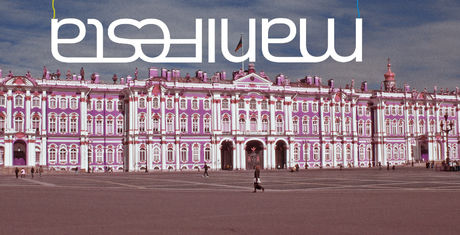Chto Delat withdraws from Manifesta 10
Public Statement from March 15, 2014
In solidarity with the Peace March in Moscow today Chto Delat announces its decision to withdraw from Manifesta 10
On March 11th, Manifesta Foundation responded to recent calls for boycotts, cancelation and postponement of Manifesta 10, planned to open at the State Hermitage Museum in early summer.
In this long-awaited statement, the foundation announced that it will not cancel under the present circumstances. Also, presumably responding to calls for the exhibition’s radicalization, curator Kasper König reaffirmed his commitment to a group show demonstrating the broadest possible spectrum of art’s possibilities, emphasizing that his contract allows artistic freedom - within the limits of the Russian law - and that he will (try) to keep the show free of censorship. But at the same time, he also restated his dislike for “cheap provocations” in topical political references, warning that Manifesta 10 at Hermitage could be “misused by political actors as a platform for their own self-righteous representation,” and insisting that “it is [his] hope to present far more than just commentary on the present political circumstances.” (http://manifesta.org/2014/03/manifesta-10-will-stay-in-st-petersburg/). It is clearly art over politics. Kaspar König’s most recent statement denigrates any attempts to address the present situation in Russia by artistic means, demoting them to “self-righteous representation” and “cheap provocation” and thus effectively preemptively censoring them.
We see now from this official reaction that neither curator nor institution are capable of rising to the challenge of a dramatically evolving political situation, and we cannot be held hostage by its corporate policies, however reasonable they would sound under different circumstance.
For this reason, we, the artists of Chto delat, have decided to withdraw our participation from the exhibition at Hermitage.
As we have said before, we are generally against boycotts and especially as far as international cultural projects in Russia are concerned. A cultural blockade will only strengthen the position of reactionary forces at a time when the marginalized anti-war movement in Russia so desperately needs solidarity. But our aim at least should be to turn every cultural project into a manifestation of dissent against the Russian government’s policy of violence, repressions, and lies. Even if you are staging Shakespeare or exhibiting Matisse, the task of culture today is to find the artistic language to bring home that simple message.
Sadly, Manifesta cannot rise to this challenge. Had the situation remained as it was, with a soft authoritarianism continuing to stagnate in Russia, the project might have been a positive factor for the further development of a fledgling public sphere. But as conditions worsen and reactionary forces grow stronger by the day, Manifesta has shown that it can respond with little more than bureaucratic injunctions to respect law and order in a situation where any and all law has gone to the wind. For that reason, any participation in the Manifesta 10 exhibition loses its initial meaning.
We have sympathy for the views expressed in the personal statement by Joanna Warsza, curator of Manifesta 10’s public program, and we would only be too happy to continue supporting her efforts. Nevertheless, her statement has a private quality, and the dangers to the project - censorship, manipulations of meaning, and intimidation, which she describes so accurately, are inevitable under current political escalation.
Warsza precisely describes the choice between engagement and the desire to stay on the sidelines. Our own choice also lies with engagement, but in forms of action and artistic expression for which we can take responsibility in this new situation. As the only “living” local participants of Kaspar König’s project, our withdrawal comes with the responsibility to address the local context and make an artistic statement independently of Manifesta, aiming for resonance both in Russia and internationally.
We are now beginning work on such a new project: a solidarity exhibition of Ukrainian and Russian artists, poets, intellectuals and cultural figures. At this terrible moment in our society’s history, we are ready to demonstrate our unity and the possibility of taking action against the war together, rising above the flood of hate, lies, manipulation, and direct violence, and not above politics.
We do not know how, when, or where this project will take place, but we are sure that working toward its realization, and not self-representation at Manifesta-Hermitage exhibition, is the only responsible way to proceed.
Chto Delat Collective
